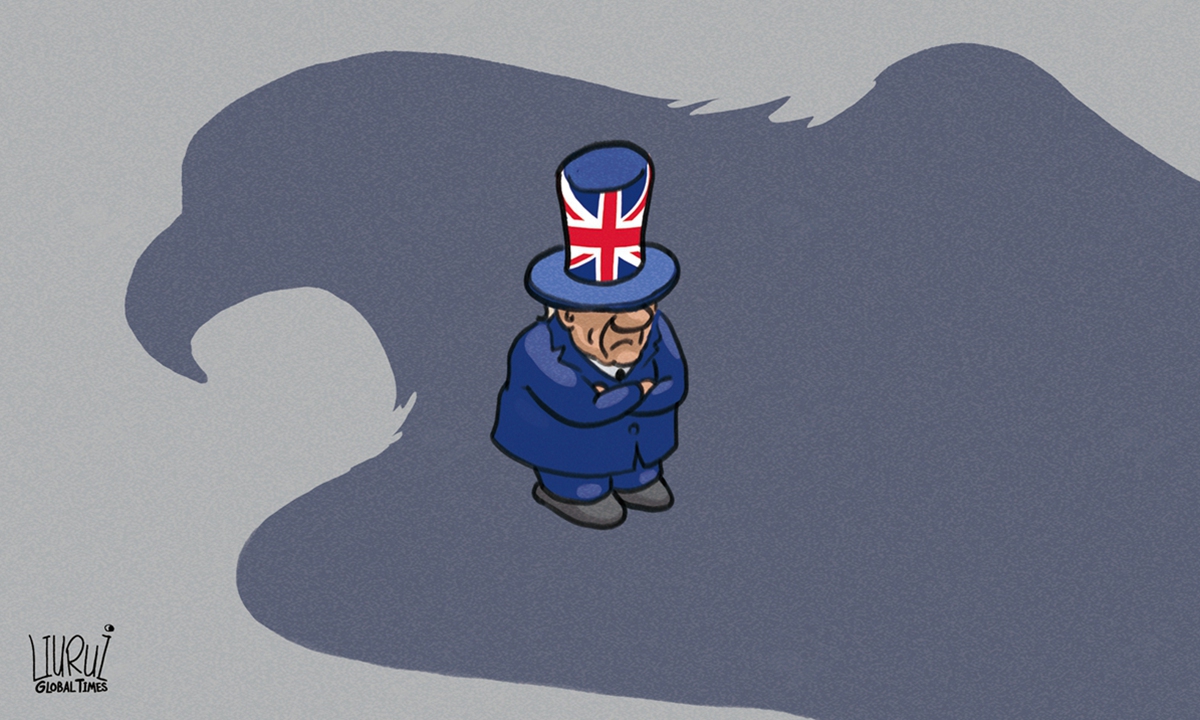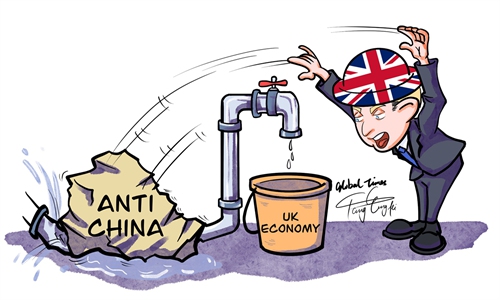
Illustration: Liu Rui/GT
UK media outlet the Sunday Times recently published an edited extract from a book written by British investigative journalist Richard Kerbaj, which revealed how the US essentially forced Britain to block Chinese tech giant Huawei from the latter's 5G network development. According to Kerbaj, the UK was originally determined to engage with Huawei in its 5G network. However, after the US exerted great pressure on London and stepped up sanctions against Huawei, the UK government, under outgoing Prime Minister Boris Johnson, eventually banned Huawei from operating in the country.Needless to say, this is profoundly embarrassing for the UK, which, following its divorce from the EU, has been seeking to bolster its global profile under the so-called Global Britain vision. This story, which comes with little surprise, makes the country look more like a US puppet, instead of a "Global Britain."
Essentially, the fact that Britain had to change its own decision and sacrifice economic interest over the 5G development just because US thought otherwise is indicative of how Britain gradually lost its economic independence to ideological bias. When Britain starts to cut off cooperation with Chinese companies in accordance to US strategic requirements and arrangements, it does nothing but harms to its own interests and everyone knows that Washington will never compensate its loss. The case with 5G is a typical example of this. Britain followed the US ideological lead to ban Huawei, but it ended up spending more money and delaying the country's 5G rollout.
Indeed, the UK itself is to blame for its stagnant post-Brexit economy. The political atmosphere and orientation is very abnormal in the UK. Some British politicians like to take every opportunity to play up the so-called "China threat" theory, while UK prime minister candidates are competing on their toughness on China, instead of solutions to the country's considerable social and economic problems. The UK government has also frequently stepped in to prevent Chinese companies from investing in struggling British businesses purely out of political bias.
Yet, British politicians' insistence on drawing ideological lines against China, the largest trading partner with more than 120 countries and the world's factory, goes against their country's basic needs and the interests of the British people.
Britain needs to be reminded that its Global Britain strategy looks increasingly like a "closer with the US" strategy. But the closer they get to the US, the worse their economy fares.
And the UK economy is indeed faltering. The Bank of England has warned the UK is sliding toward a recession and will keep shrinking until the end of 2023. Consumer price index in the UK rose to 40-year high of 10.1 percent in July. Workers at the UK's largest container port began an eight-day strike this week, the latest action by workers in an array of industries calling for higher pay amid soaring inflation.
Whether they like it or not, British politicians need to recognize that win-win cooperation with China can actually help Britain alleviate many of its economic problems, while "decoupling" from China would make its economy even more vulnerable.
At present, the US is on the verge of falling into a recession, while Europe is facing record high inflation. By comparison, China has been able to manage a relatively steady economic growth with its resilient manufacturing sector, despite all the headwinds from home and abroad.
Maybe it is time for British politicians to think rationally about what kind of China policy is best for the UK, instead of shamelessly and irresponsibly sacrificing UK's economic interests to just please Washington.
This is also true for many US allies, particularly those in Europe. Given the energy and economic crisis facing European economies, it is paramount for countries to protect their domestic economies from the US' political agenda, which only ends up leaving European countries taking the hit, while the US gains, as shown in the Russia-Ukraine conflict.



